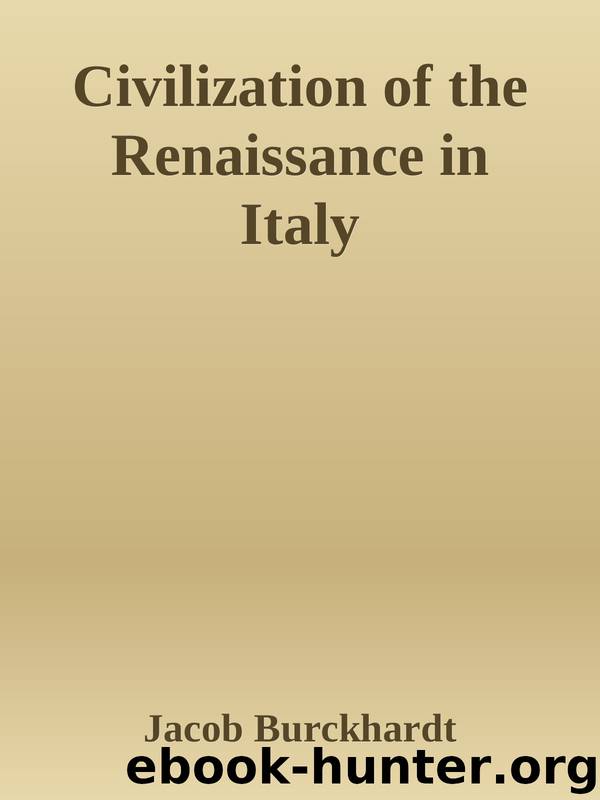Civilization of the Renaissance in Italy by Jacob Burckhardt

Author:Jacob Burckhardt [Burckhardt, Jacob]
Language: eng
Format: epub
Published: 0101-01-01T00:00:00+00:00
PART FOUR. THE DISCOVERY OF THE WORLD AND OF MAN
Journeys of the Italians
Freed from the countless bonds which elsewhere in Europe checked progress, having reached a high degree of individual development and been schooled by the teachings of antiquity, the Italian mind now turned to the discovery of the outward universe, and to the representation of it in speech and form.
On the journeys of the Italians to distant parts of the world, we can here make but a few general observations. The Crusades had opened unknown distances to the European mind, and awakened in all the passion for travel and adventure. It may be hard to indicate precisely the point where this passion allied itself with, or became the servant of, the thirst for knowledge; but it was in Italy that this was first and most completely the case. Even in the Crusades the interest of the Italians was wider than that of other nations, since they already were a naval power and had commercial relations with the East. From time immemorial the Mediterranean Sea had given to the nations that dwelt on its shores mental impulses different from those which governed the peoples of the North; and never, from the very structure of their character, could the Italians be adventurers in the sense which the word bore among the Teutons. After they were once at home in all the eastern harbors of the Mediterranean, it was natural that the most enterprising among them should be led to join that vast inter- national movement of the Mohammedans which there found its outlet. A new half of the world lay, as it were, freshly discovered before them. Or, like Polo of Venice, they were caught in the current of the Mongolian peoples, and carried on to the steps of the throne of the Great Khan. At an early period, we find Italians sharing in the discoveries made in the Atlantic Ocean; it was the Genoese who, in the thirteenth century found the Canary Islands. In the same year, 1291, when Ptolemais, the last remnant of the Christian East, was lost, it was again the Genoese who made the first known attempt to find a sea-passage to the East Indies. Columbus himself is but the greatest of a long list of Italians who, in the service of the western nations, sailed into distant seas. The true discoverer, however, is not the man who first chances to stumble upon anything, but the man who finds what he has sought. Such a one alone stands in a link with the thoughts and interests of his predecessors, and this relationship will also determine the account he gives of his search. For which reason the Italians, although their claim to be the first comers on this or that shore may be disputed, will yet retain their title to be pre-eminently the nation of discoverers for the whole latter part of the Middle Ages. The fuller proof of this assertion belongs to the special history of discoveries.
Download
This site does not store any files on its server. We only index and link to content provided by other sites. Please contact the content providers to delete copyright contents if any and email us, we'll remove relevant links or contents immediately.
| Africa | Americas |
| Arctic & Antarctica | Asia |
| Australia & Oceania | Europe |
| Middle East | Russia |
| United States | World |
| Ancient Civilizations | Military |
| Historical Study & Educational Resources |
Room 212 by Kate Stewart(5093)
The Crown by Robert Lacey(4793)
Endurance: Shackleton's Incredible Voyage by Alfred Lansing(4744)
The Iron Duke by The Iron Duke(4340)
The Rape of Nanking by Iris Chang(4191)
Joan of Arc by Mary Gordon(4082)
Killing England by Bill O'Reilly(3987)
Say Nothing by Patrick Radden Keefe(3966)
I'll Give You the Sun by Jandy Nelson(3421)
Shadow of Night by Deborah Harkness(3344)
Hitler's Monsters by Eric Kurlander(3321)
Mary, Queen of Scots, and the Murder of Lord Darnley by Alison Weir(3191)
Blood and Sand by Alex Von Tunzelmann(3181)
Eleanor & Park by Rainbow Rowell(3143)
Darkest Hour by Anthony McCarten(3113)
Margaret Thatcher: The Autobiography by Thatcher Margaret(3069)
Book of Life by Deborah Harkness(2914)
Red Famine: Stalin's War on Ukraine by Anne Applebaum(2912)
The One Memory of Flora Banks by Emily Barr(2850)
